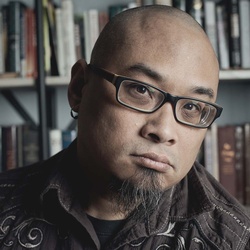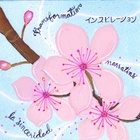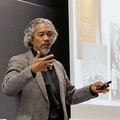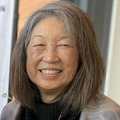今月の特集は、ミシガン州グランドラピッズから、トッド・カネコの詩集『 This Is How the Bone Sings』から抜粋したものです。これらの詩は、私にとっては心の底から響きました。幽霊、土地、感覚的な叫びに近い、時には圧倒的に近い現在のレンズを通して、私たちの過去を突いたり、つついたり、そっと突いたり、叩いたり、考えたり、かじったりします。この美しい文章は、私たちをミニドカへと導くと同時に、失踪、沈黙、そして清算に耐えなければならなかったすべての場所と人々の驚異の中にしっかりと位置づけてくれます。お楽しみください...
— トレイシー・カトウ・キリヤマ
* * * * *
W. トッド カネコは、詩集『This Is How the Bone Sings』および『The Dead Wrestler Elegies』の著者です。また、アモラック ヒューイとの共著で、詩集『Slash / Slash and Poetry: A Writers' Guide and Anthology』を出版しています。彼の詩は、 Poetry 、 Alaskan Quarterly Review 、 Massachussets Review 、 The Normal School 、 Barrelhouse 、Verse Daily、Poetry Daily、American Academy of Poets Poem-A-Day などに掲載されています。Kundiman フェローであり、ミシガン州グランドラピッズ在住で、グランドバレー州立大学で教鞭を執っています。牛の虐待
歌の一つのバージョンでは、私は生まれた
牛の頭で。私たちはみんな
アメリカが消えるのを待っている
散り散りに疲れた私たちを草原から
草の上でミルクとサーロインを味わいます。
もうひとつのバージョンでは、私は人間です。
死肉、毛皮、軟骨に膝まで浸かる
国の骨の上に。私は人々を見守る
血まみれのあごで彼らは言う。神は
アメリカを祝福してください。動物は死ぬと言われていますが、
動物たちは生き返ります。
ミニドカはアイダホ州の強制収容所だった
私の先祖は皆
鳥のように私の言葉を集めた
死者の毛髪を集める
巣作り、静寂の豊かさ、
束ねる準備が整った糸がいっぱい
木々に私を。私は新米の父親です。
幽霊の話には若すぎる、新鮮すぎる
震えがどんな感じだったか思い出す
大草原で自分の息が見える
時々息子が泣くと
夜に。彼は説明する必要はない
暗闇の中で彼が恐れるもの
祖母が私に言ったから
世界は私たちにとって決して安全ではない
彼女が名前を言うことを拒否したとき
私たちが生まれた場所のミニドカ
私は彼に言う、そして私の先祖は横たわっている
指を唇に当てて。恥ずかしがらないで
私たちが生きているから、鳥たちが
いつか私たちを根こそぎ取り除いてくれるでしょう。
生得権
明日、あなたは「ミニドカはどこにあるの?」と尋ねるでしょう。
ビールを飲み干して何も言わない
ただし、それはあなたが置いた場所にあります。
父はアイダホと言うでしょう、
しかし、彼の母親は、それはここにあると言うでしょう。
我が家の誰もが知っている
死者を生き返らせるのがいかに簡単か
答えがいかにして道を切り開くか
少年の勇気と爆発を通して
彼の喉からは狼の遠吠えが聞こえた。
肉食的な質問
私たちが住んでいる場所について空に向かってポーズをとる、
他に誰がまだ生きているのか。夜になると、
私はあなたの額に手を置きます
そしてあなたが追いかけるカモシカを感じてください
目を閉じて。彼らは外にいる
窓は今、聞いている
あなたの答えに対して。
*これらの詩は『 This Is How the Bone Sings 』(2020年)からのもので、W. Todd Kanekoが著作権を所有しています。
© 2020 W. Todd Kaneko








